
Notion ↔ Google Agenda | Automatisation [Tuto 2024]
Êtes-vous fatigué de mettre à jour manuellement votre Notion et Google Agenda? Fatigué d'attendre que Notion publie sa propre intégration?Dans ce tuto, je vais vous montrer comment créer une synchronisation bidirectionnelle entre Notion et Google Agenda, donc vous n'aurez plus jamais à vous soucier de double réservations ou de manquer des événements importants.
Avec ces instructions faciles à suivre, vous pourrez intégrer sans problème votre Notion et Google Agenda en un rien de temps. Dites adieu aux mises à jour manuelles et bonjour à la planification efficace avec notre synchronisation Notion Google Agenda.
En plus de Notion & Google, tout ce dont vous aurez besoin est un compte Make (100% gratuit).
Synchronisation bidirectionnelle
Une synchronisation bidirectionnelle signifie que vous obtiendrez tous vos événements Google Agenda dans votre calendrier Notion (c'est un sens). Mais cela signifie aussi que vous pourrez inclure ou mettre à jour des événements sur Notion, et les modifications seront reflétées dans vos événements Google Agenda! De cette façon, tout événement ajouté, modifié ou supprimé sur un calendrier sera également sur l'autre calendrier.
Ce tutoriel est axé sur Google Agenda, mais les mêmes principes s'appliquent pour Apple Calendar ou tout autre calendrier avec une API (et disponible sur Make).
⚠️ Ce tutoriel est en anglais!
Automatisation Notion Google Agenda
Construis ta base de données Notion
All you really need to start is a simple Notion table (it doesn’t need to be a Calendar view for now) with the following properties:
- Name [Title]
- Date [Date]
- Location [Text, or URL if you only have virtual meetings]
- Event Status [Text]
- Gcalendar ID [Text]
Google Agenda à Notion
This first scenario will enable you to get your Google Calendar events into Notion.
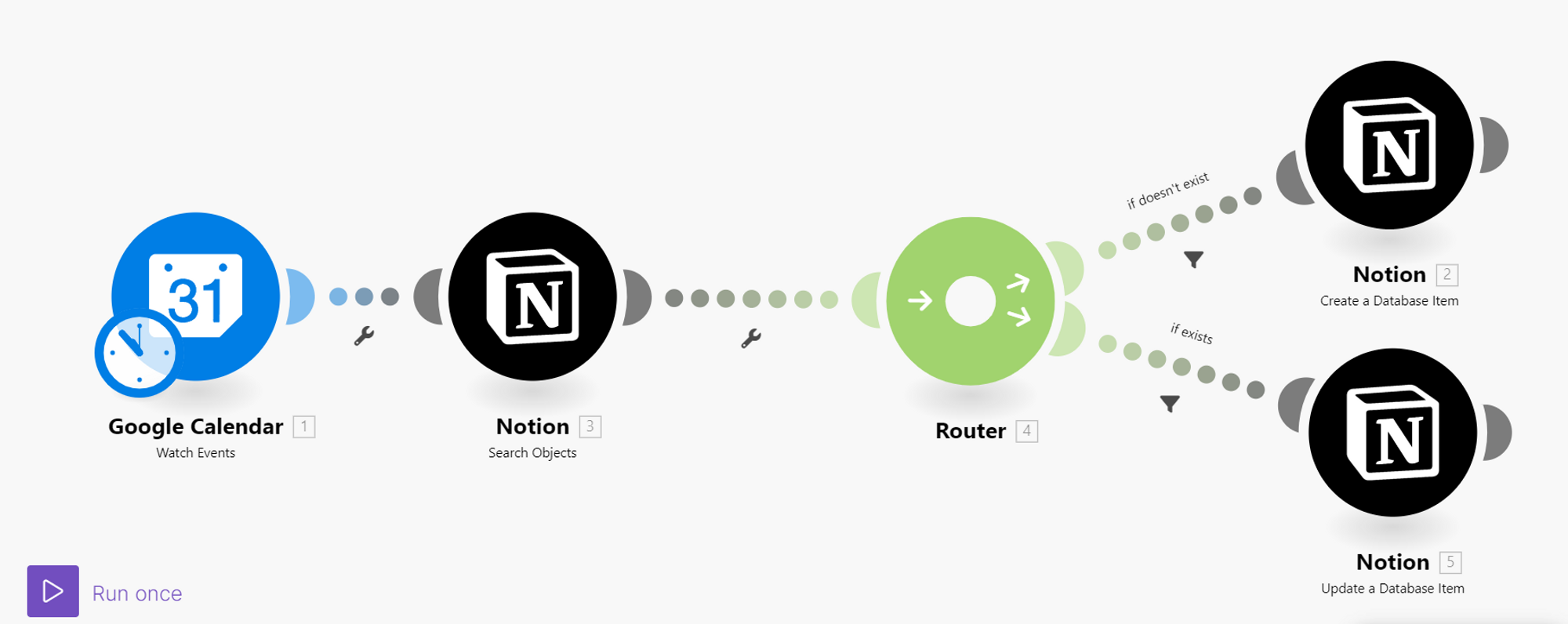
Initialisation
- Go to Make (#affiliate)
- Create an account if you don’t have one already
- Go to your scenarios & hit the + Create a new scenario button
1er Module: Google Agenda
- Hit the big “+” button to build your first module
- Search Google Calendar in the applications & choose Watch Events
➡️ Add a new connection if you never connected your Google Calendar to Make & follow the steps - Fill out the information:
➡️ Calendar = your desired calendar
➡️ Watch Events = By Updated Date
➡️ Show deleted events = Yes
➡️ Query: keep it blank
➡️ Limit = 10 - OK
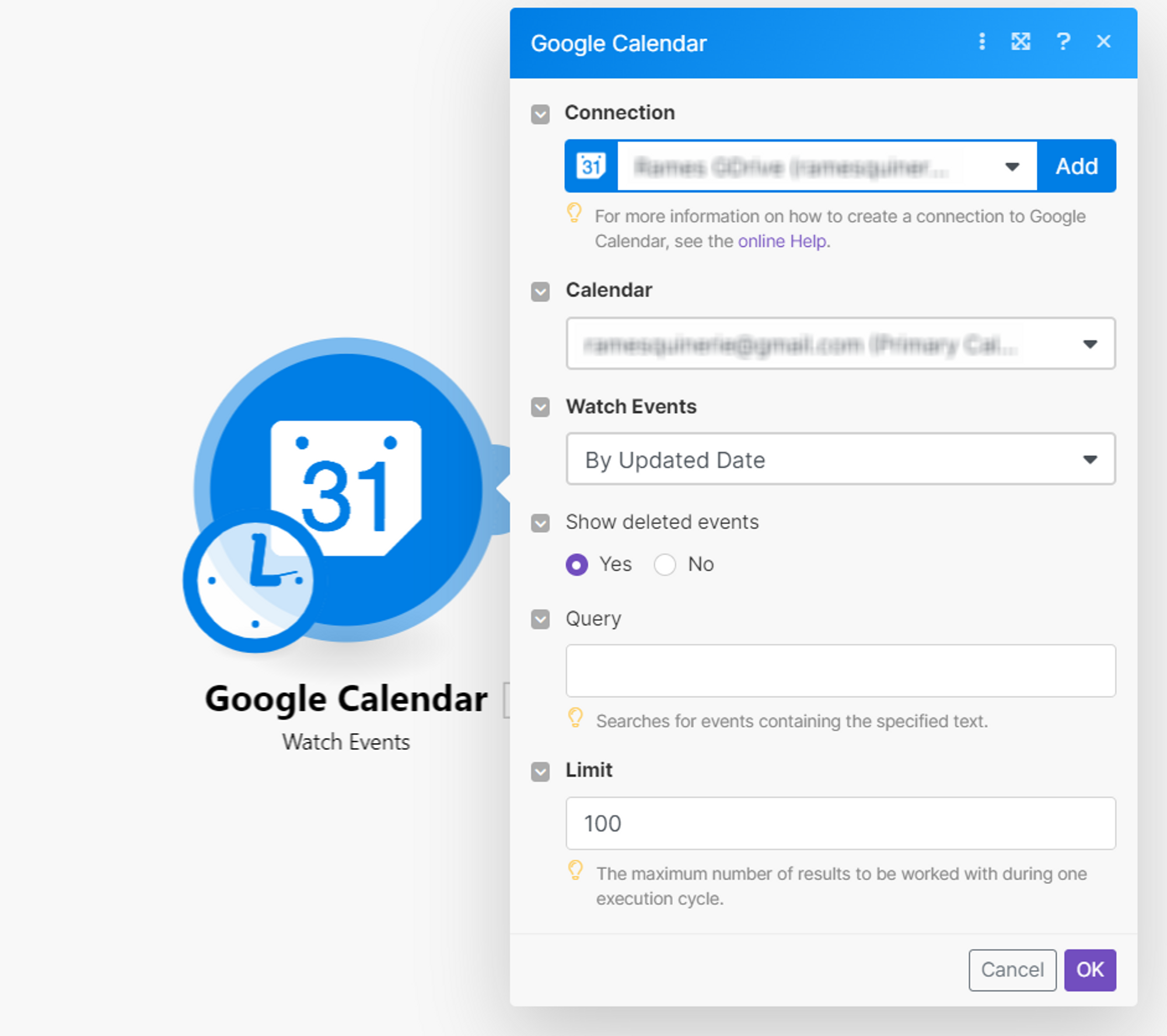
2ème Module: Notion
- Add another module (to the right of your Google Calendar module)
- Search Notion in the applications & choose Search Objects
➡️ Create a new connection if you never connected your Notion to Make & follow the steps
⚠️ Make sure to choose the parent page where your calendar exists (or your entire workspace if you’re not sure) - Fill out the information:
➡️ Search Objects = Database Items
➡️ Database ID*
➡️ Filter: Gcalendar ID (Notion) = Event ID (Google Calendar)
➡️ Limit = 1 - OK
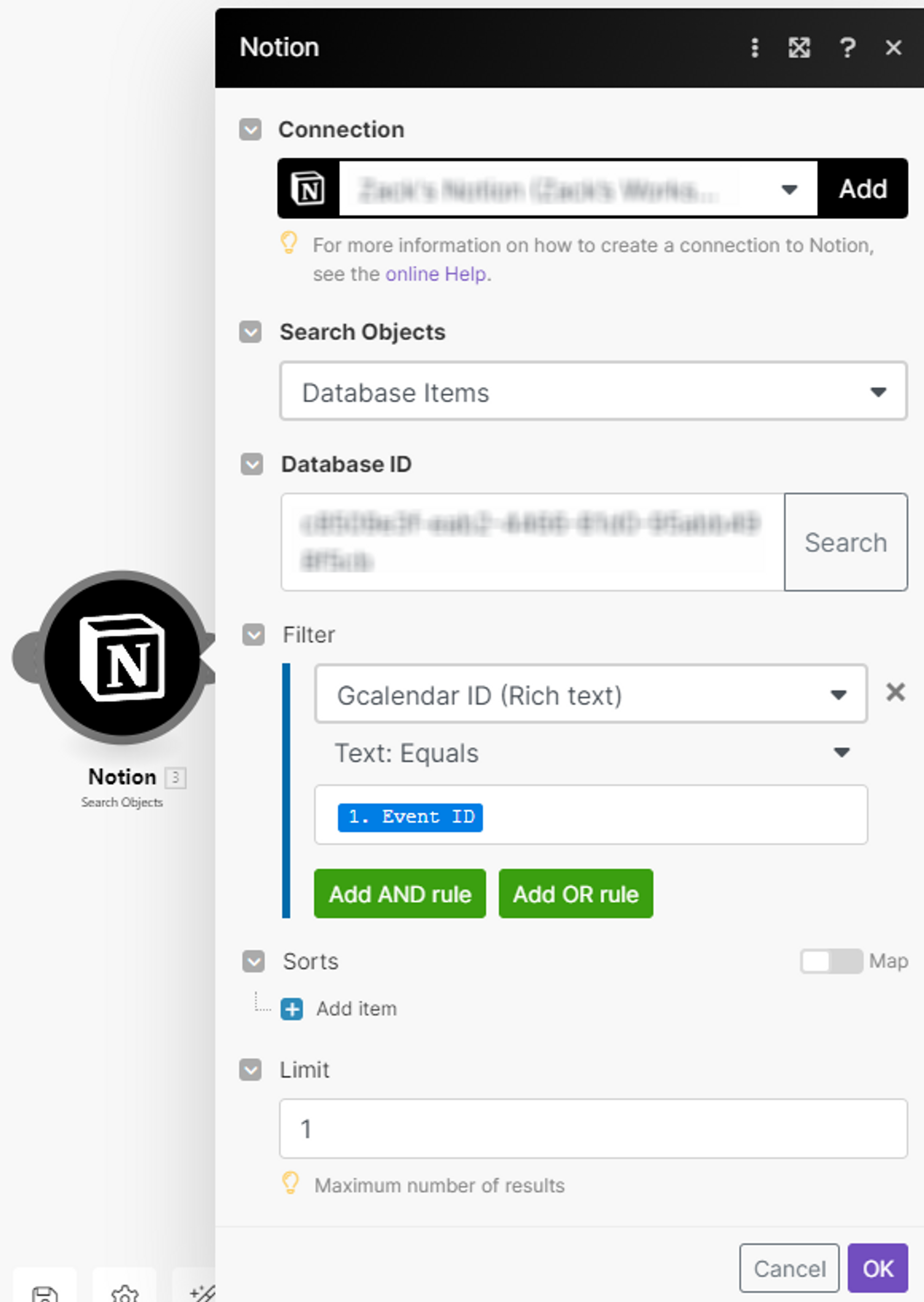
*To find your ID: Open the database as a full page in Notion. Use the Share menu to Copy link. Now paste the link in your text editor so you can take a closer look. The URL uses the following format: https://www.notion.so/{workspace_name}/{database_id}?v={view_id}
OR Click Search & input the exact name of the database
Filtre entre Google Agenda & Notion
If you used your Google Calendar for a while, you may want to set up a filter between the first Google module and the second Notion module.
- Name the filter something like “New events”
- In the filter, add
➡️ Start (from Google Calendar)
➡️ Later than (datetime operator)
➡️ Date: put today’s date or whatever suits you best - OK

3ème module: Router
- Add another module
- Search for Flow Control & choose Router (it will automatically make 2 paths)
4ème Module: Chemin du haut
- Connect a new Notion module & choose Create a Database Item
- Fill out information
➡️ Database ID = the same as previously
➡️ Name = Summary
➡️ Gcalendar ID = Event ID
➡️ Date
➡️➡️Start Time = Start
➡️➡️ End Time = End
➡️ Include Time = Yes
➡️ Location = Location
➡️ Event Status = Status
(⚠️ very important as only events with “Event Status” = “confirmed” will be tracked in Notion) - OK
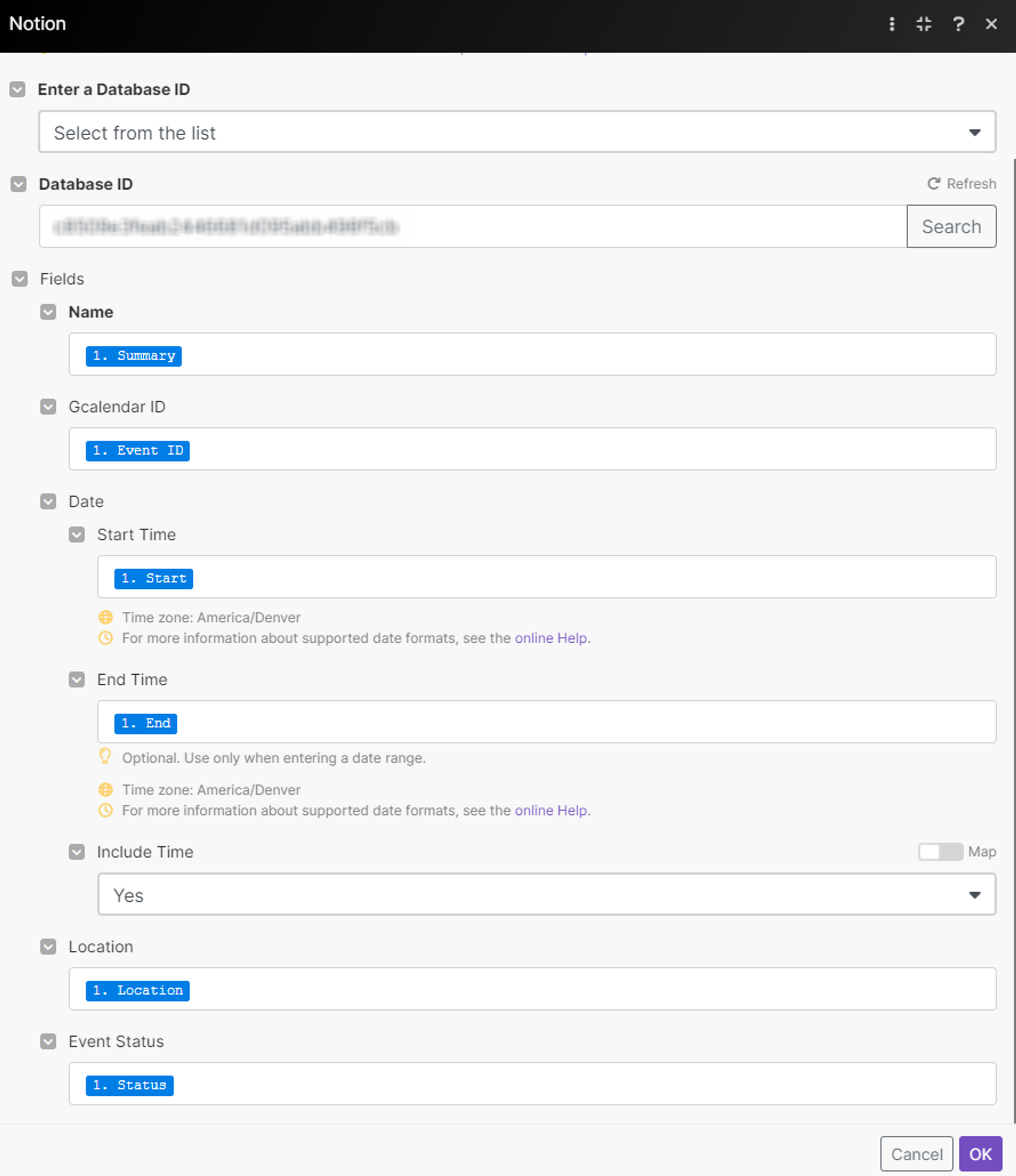
Chemin du haut: filtre
Filter between the Router & the Notion module:
- Choose the 🔧 & select Set up a filter
➡️ Label = “if doesn’t exist”
➡️ Condition = 3. Object → “Basic Operators: Does not exist”
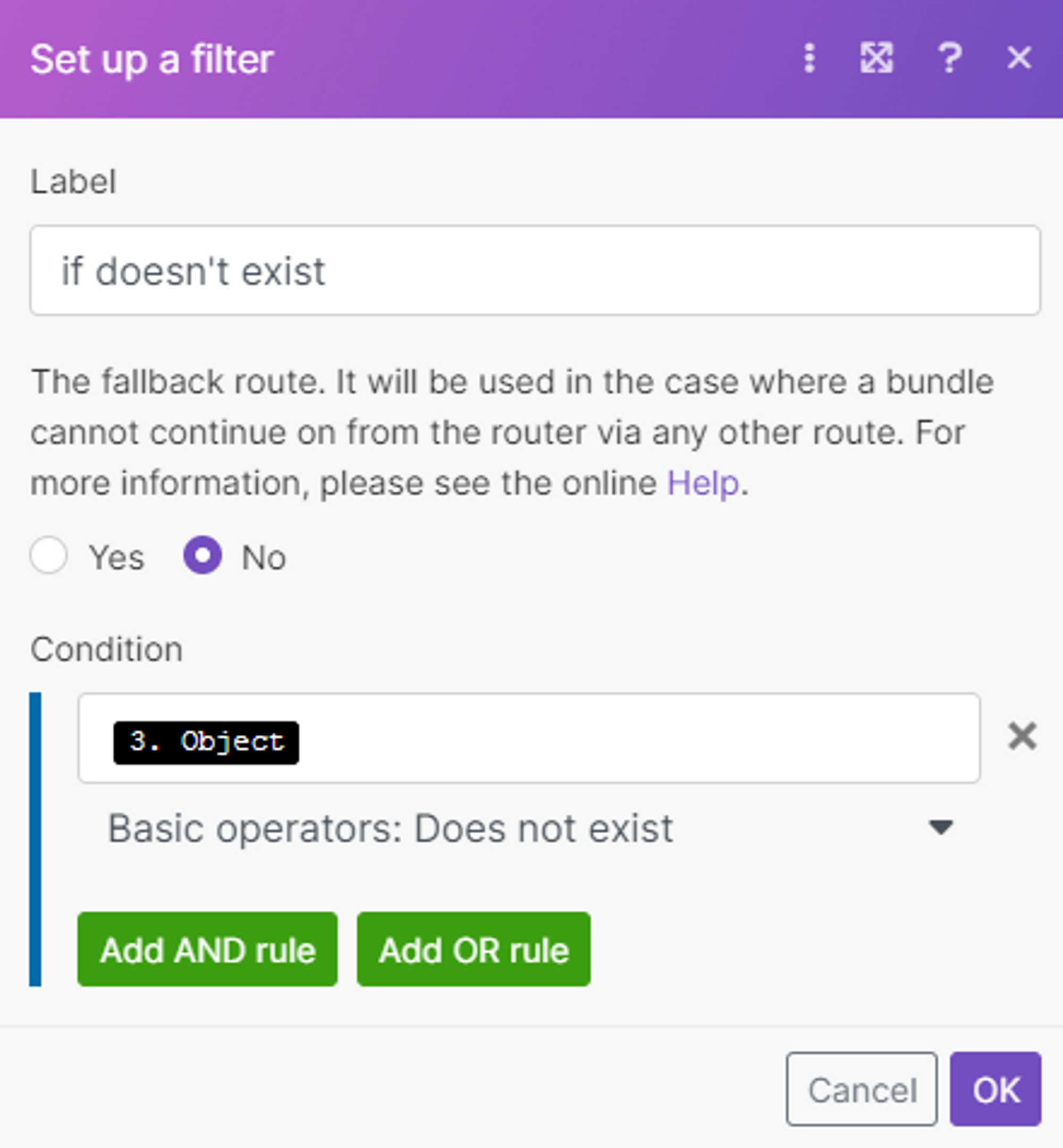
5ème Module: Chemin du bas
- Connect a new Notion module & choose Update a Database Item
➡️ Database ID = the same as previously
➡️ Database Item ID = Page ID (from Notion)
➡️ Name = Summary
➡️ Gcalendar ID = Event ID
➡️ Date
➡️➡️ Start Time = Start
➡️➡️ End Time = End
➡️ Include Time = Yes
➡️ Location = Location
➡️ Event Status = Status (⚠️ very important as only events with “Event Status” = “confirmed” will be tracked in Notion) - OK
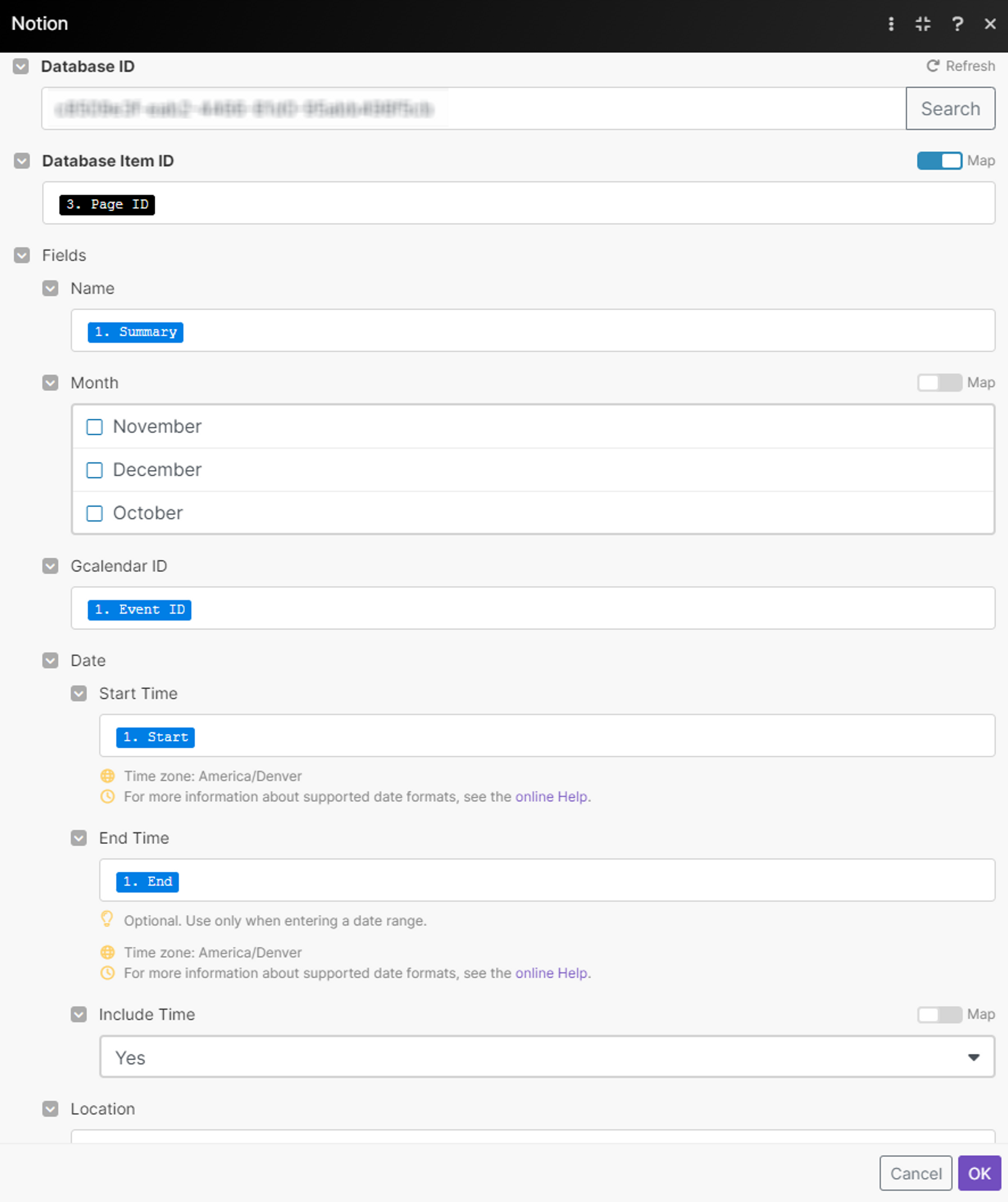
Chemin du bas: filtre
- Choose the 🔧 & select Set up a filter
➡️ Label = “if exist”
➡️ Condition = 3. Object → “Basic Operators: Exists”

Dernières Étapes
Access the clock next to the first module (Google Calendar) & set the scheduling (in minutes).
⚠️ The higher the number, the fewer “operations” (data) will be used by Make. It’s something to consider if you wish to stay on Make’s free plan (1000 ops/month).
Congrats! The scenario is finished, don’t forget to save it. Add a dummy event on your Google Calendar and run the scenario to see if it works (it works if you see your newly created event inside your Notion table). If it works, you can also increase the limit from the first module to 100 or whatever suits you.
Notion à Google Agenda
⚠️ Apply this scenario only if you plan on updating your Google Calendar from Notion.
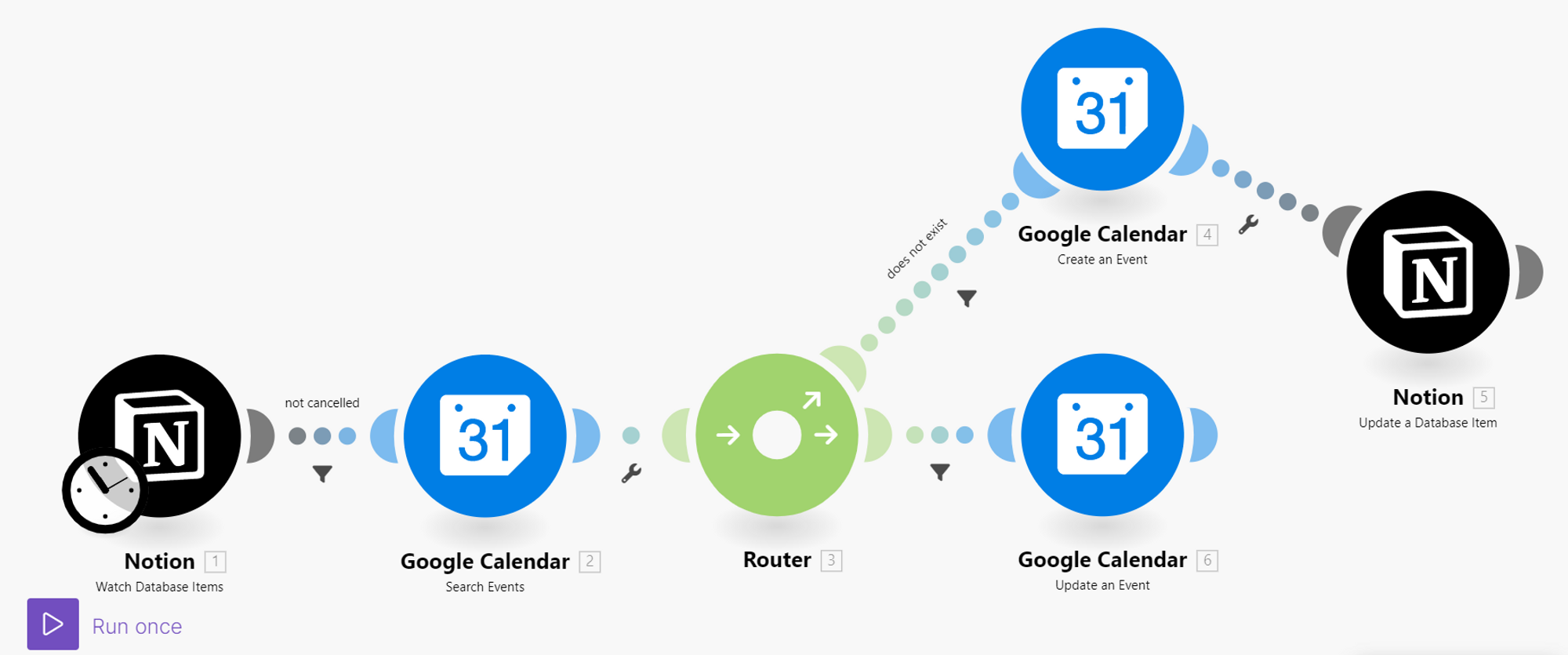
Initialisation
- Go to your scenarios & click + Create a new scenario
1er Module: Notion
- Click the big “+” button to build your first module
- Search Notion in the list of applications & choose Watch Database Items (your Notion should already be connected from the 1st scenario)
- Fill out the information:
➡️ Watch Database Items = By updated time
➡️ Database ID = same ID as in first scenario
➡️ Limit = 10 - OK
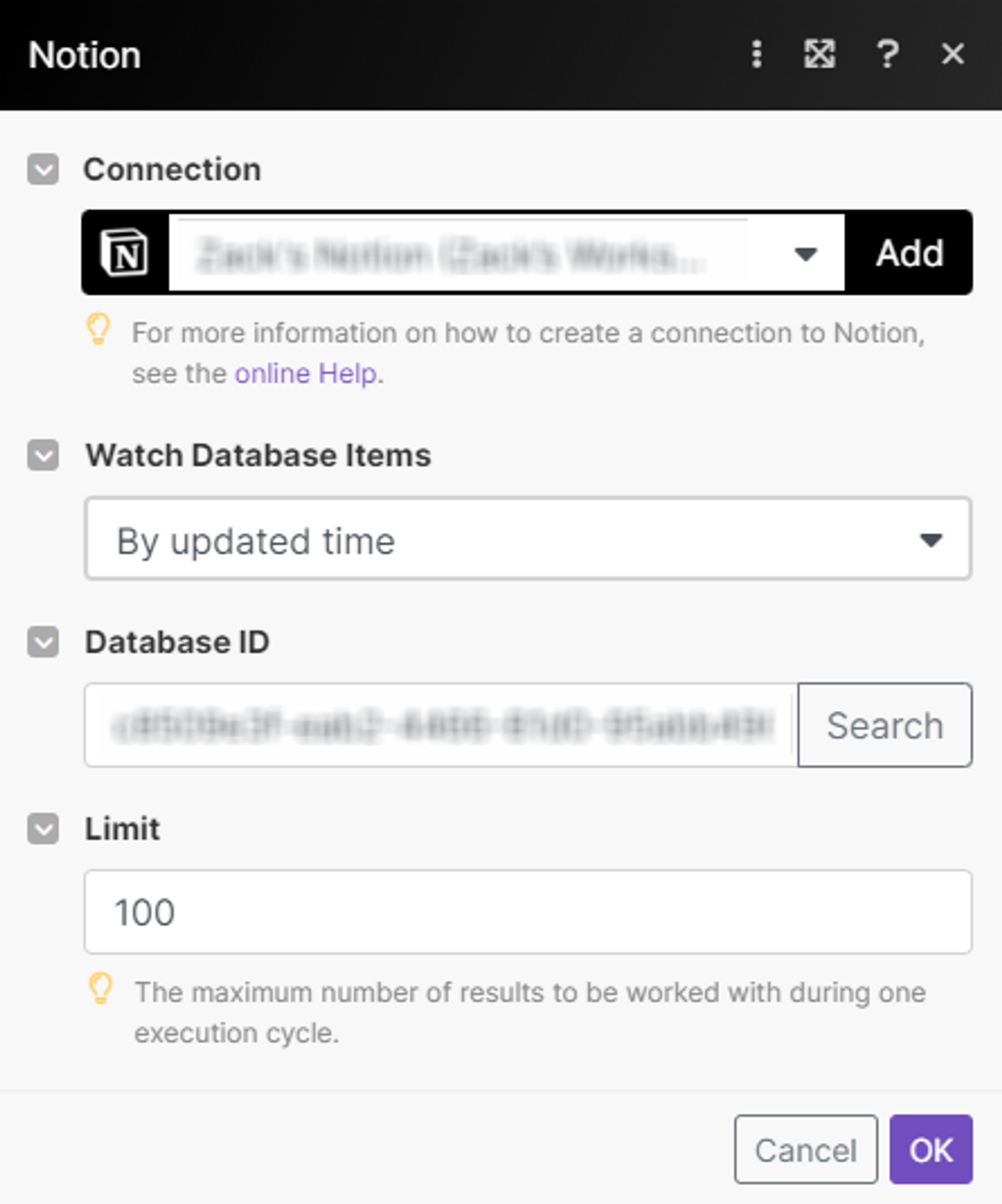
2ème Module: Google Agenda
- Click Add another module (to the right of your Notion module)
- Search Google Calendar in the list of applications & choose Search Events
- Fill out the information:
➡️ Calendar ID = your calendar (should be the same as in scenario 1)
➡️ Query = Properties Value.Gcalendar ID[ ]:Plain Text (GCalendar ID from Notion)
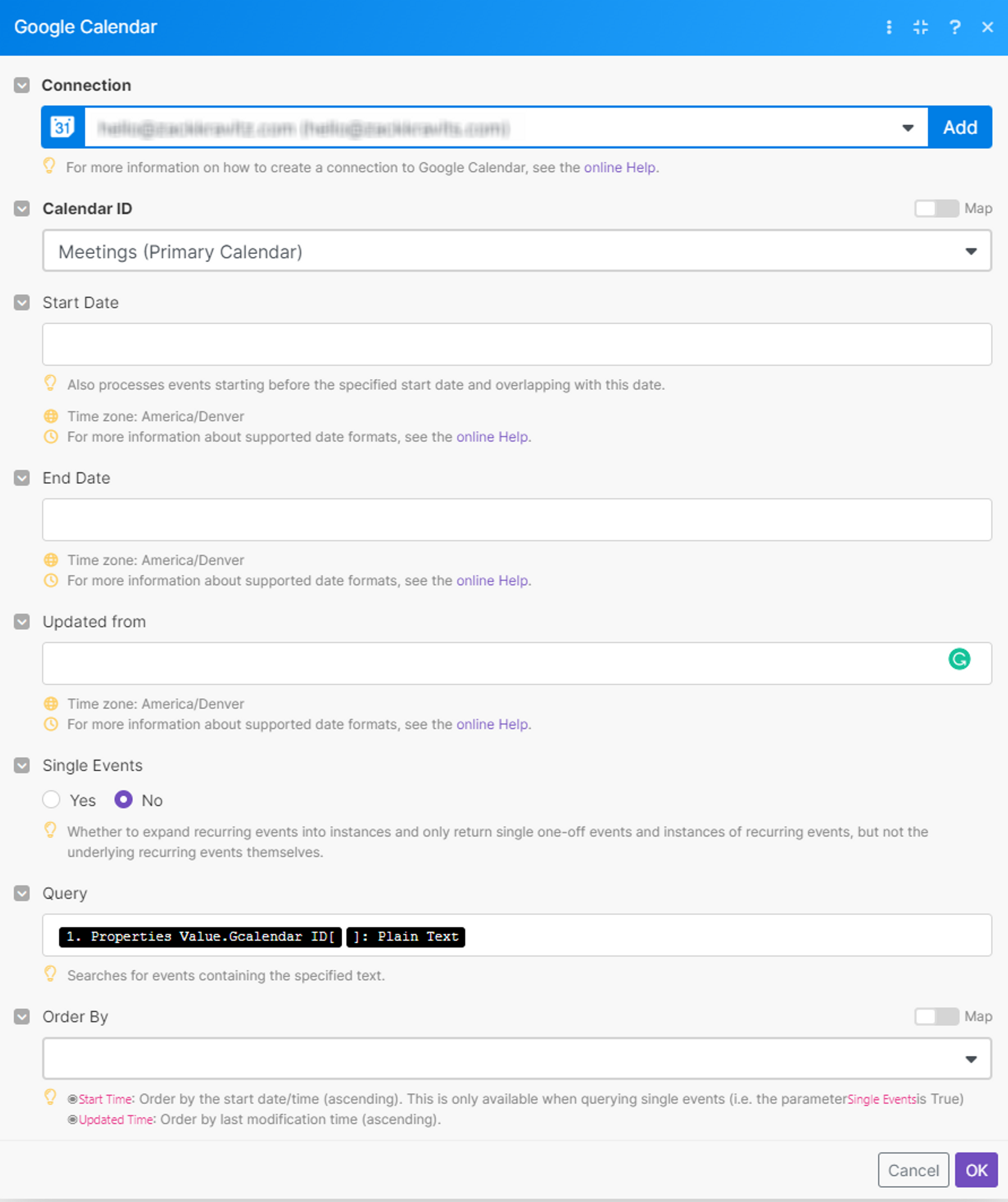
Filtre entre Notion & Google Agenda
Add a filter between the first & second modules (choose the 🔧 & select Set up a filter)
Fill out the information:
- Label = not cancelled
- Condition:
➡️ Properties Value.Event Status[ ]: Plain Text
➡️ Text operators: Not equal to
➡️ cancelled - OK
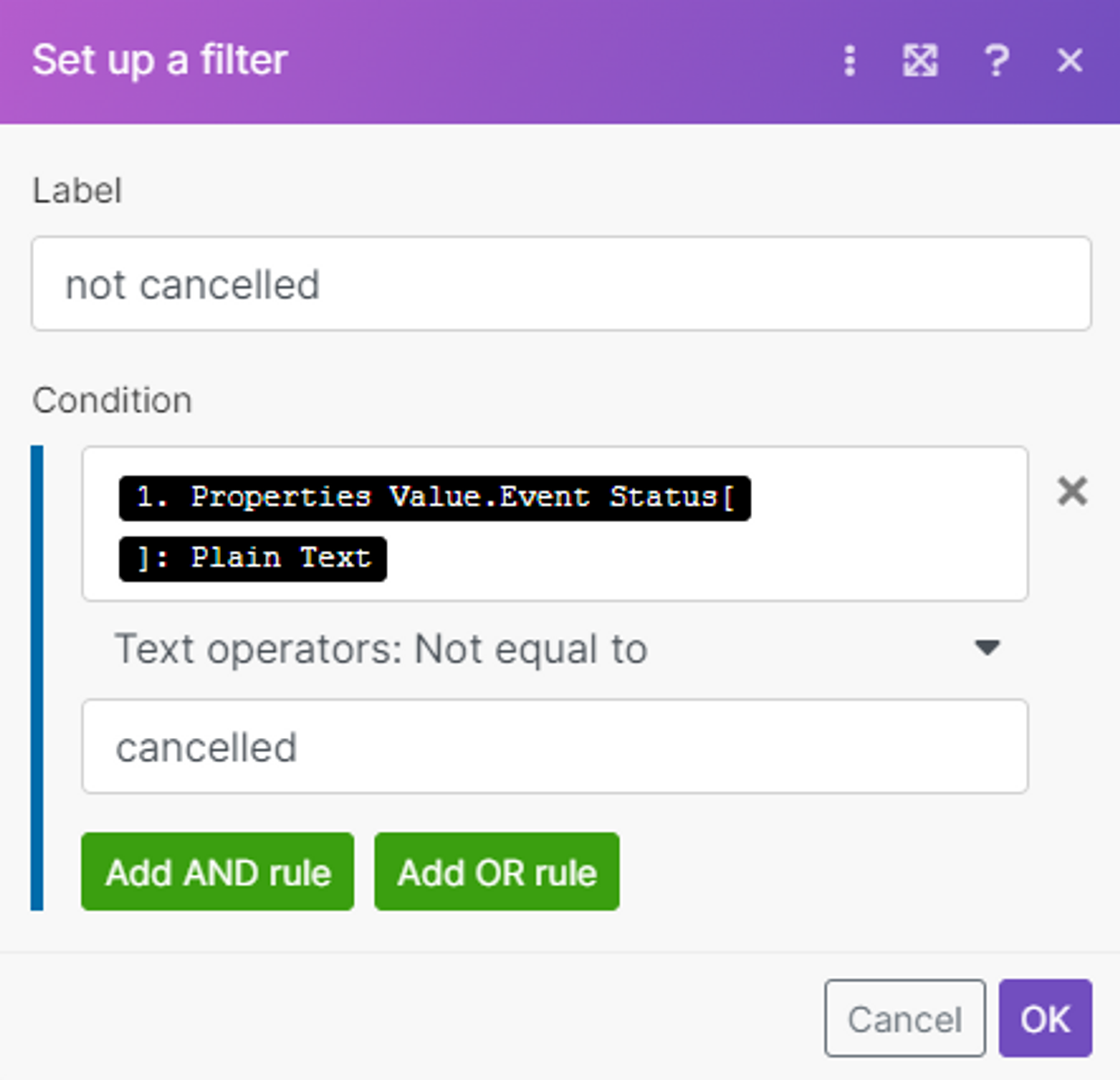
3ème Module: Router
- Next to the Google Calendar, click to include a new module
- Search for Flow Control & go for Router (it will automatically make 2 paths)
4ème Module: Google Agenda (Chemin du haut)
- Connect a new Google Calendar module after the filter & choose Create an Event
- Fill out information
➡️ Event Name = Properties Value.Name[ ]:Plain Text
➡️ Start Date = Properties Value: Date : Start
➡️ End Date = Properties Value: Date : End
➡️ Location = Properties Value.Location[ ]:Plain Text - OK
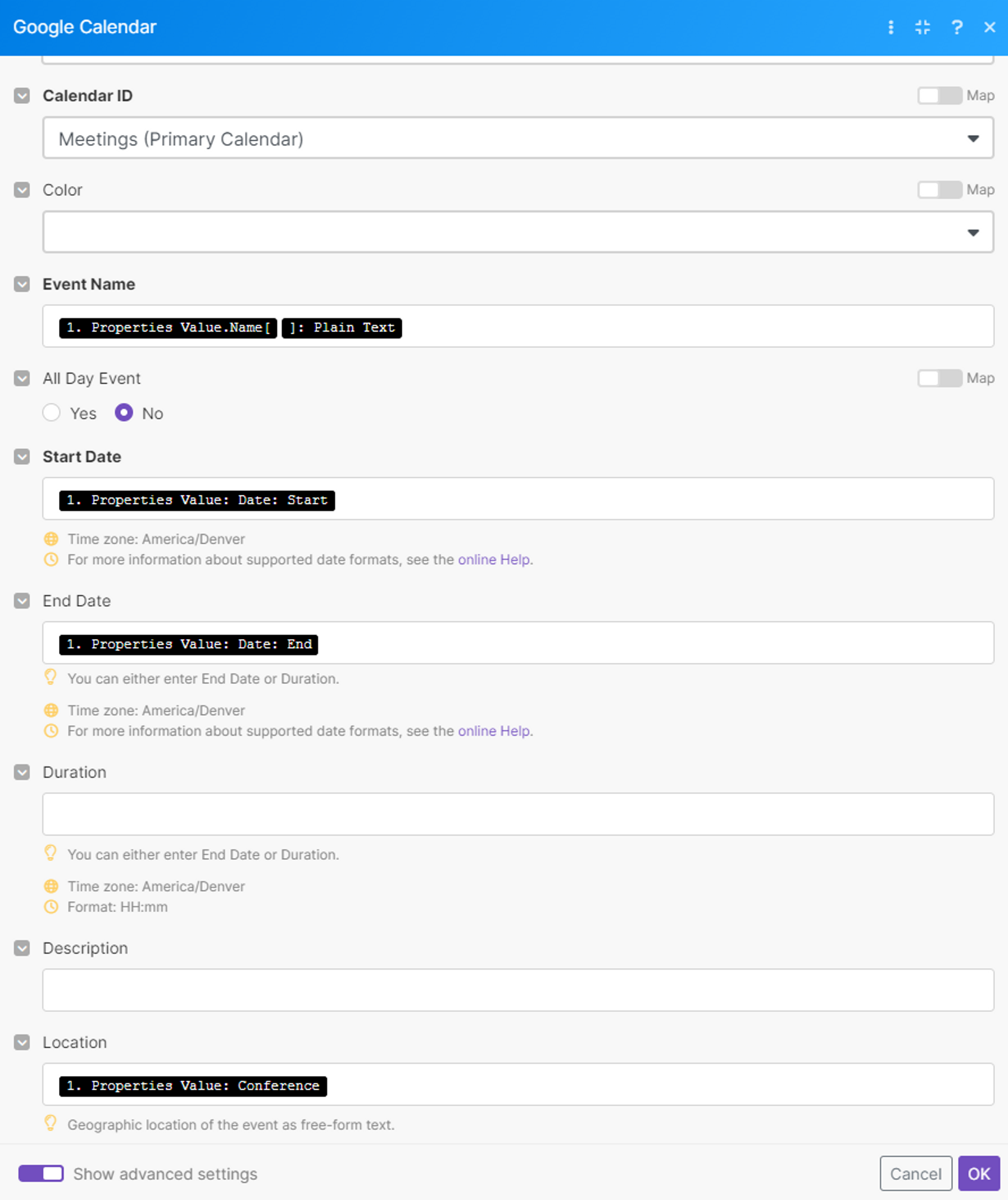
Chemin du haut: filtre
- Choose the 🔧 & select Set up a filter (between the router & the Google Calendar module)
➡️ Label = does not exist
➡️ Condition: Properties Value.Gcalendar ID[ ]:Plain Text → “Basic Operators: Does not exist” - OK
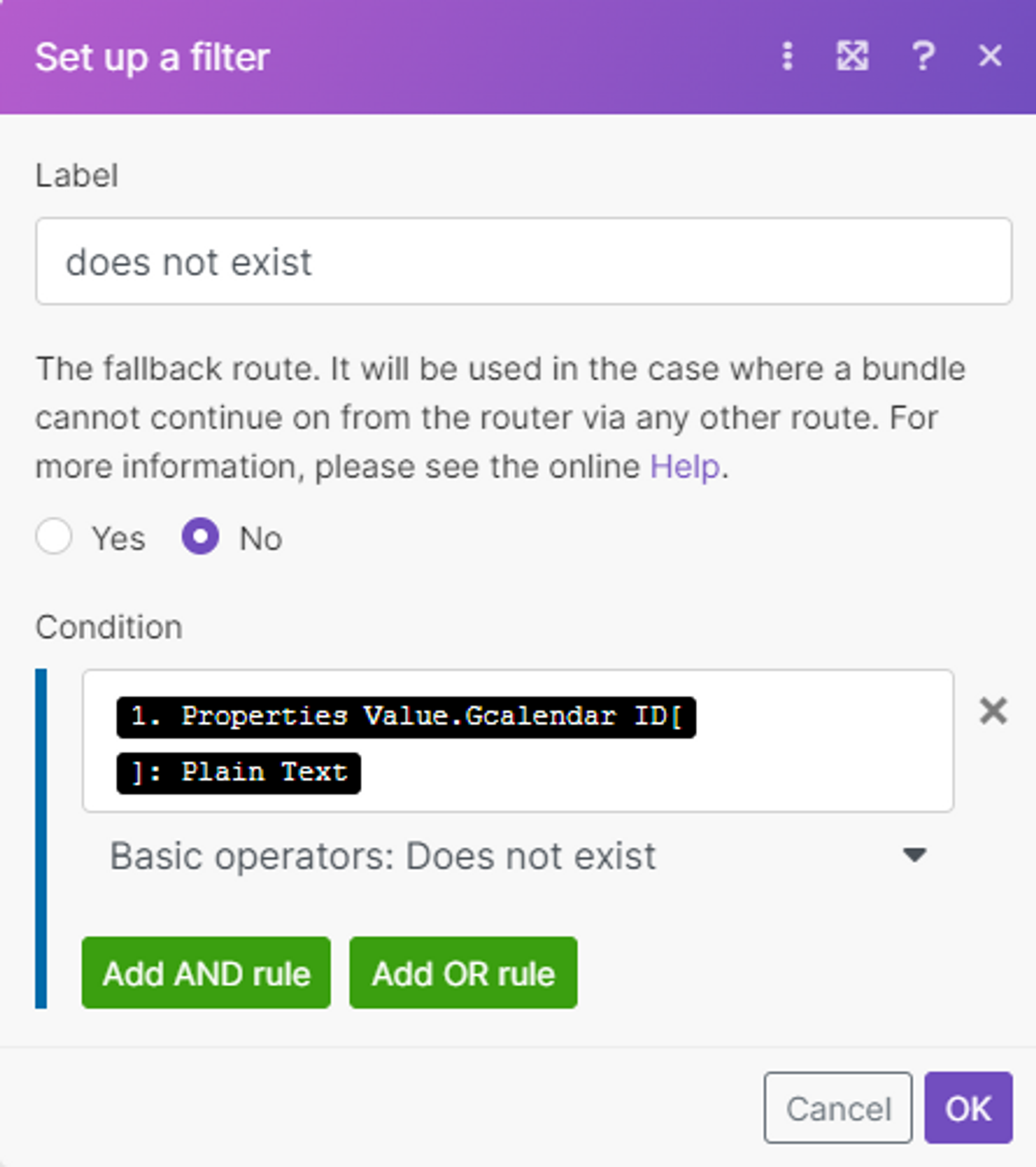
5ème Module: Notion (chemin du haut)
- Next to the Google Calendar, click to include a new module
- Search for Notion & choose Update Database Item
- Fill out information
➡️ Database ID = same ID as in first scenario
➡️ Database Item ID = Database Item ID (from Notion)
➡️ Gcalendar ID = Event ID (from Google Calendar)
➡️ Event Status = Status (from Google Calendar) - OK
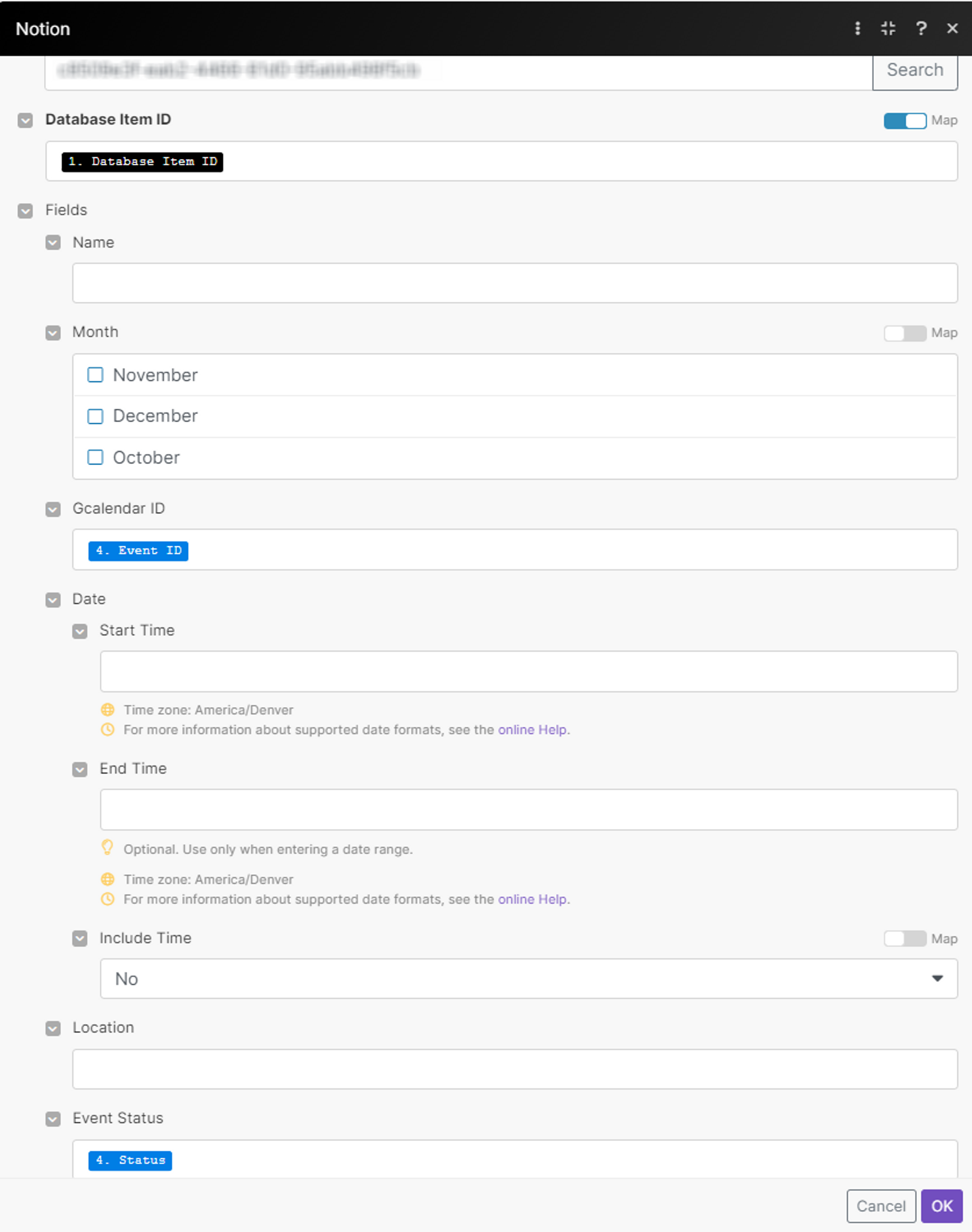
6ème Module (chemin du bas)
- Connect a new Google Calendar module after the filter & choose Update an Event
- Fill out information
➡️ Event ID = Properties Value.Gcalendar ID[ ]:Plain Text
➡️ Event Name = Properties Value.Name[ ]:Plain Text
➡️ Start Date = Properties Value: Date : Start
➡️ End Date = Properties Value: Date : End
➡️ Location = Properties Value.Location[ ]:Plain Text - OK

Chemin du bas: filtre
- Choose the 🔧 & select Set up a filter
➡️ Label = exists
➡️ Condition: Properties Value.Gcalendar ID[ ]:Plain Text → “Basic Operators: Exists” - OK
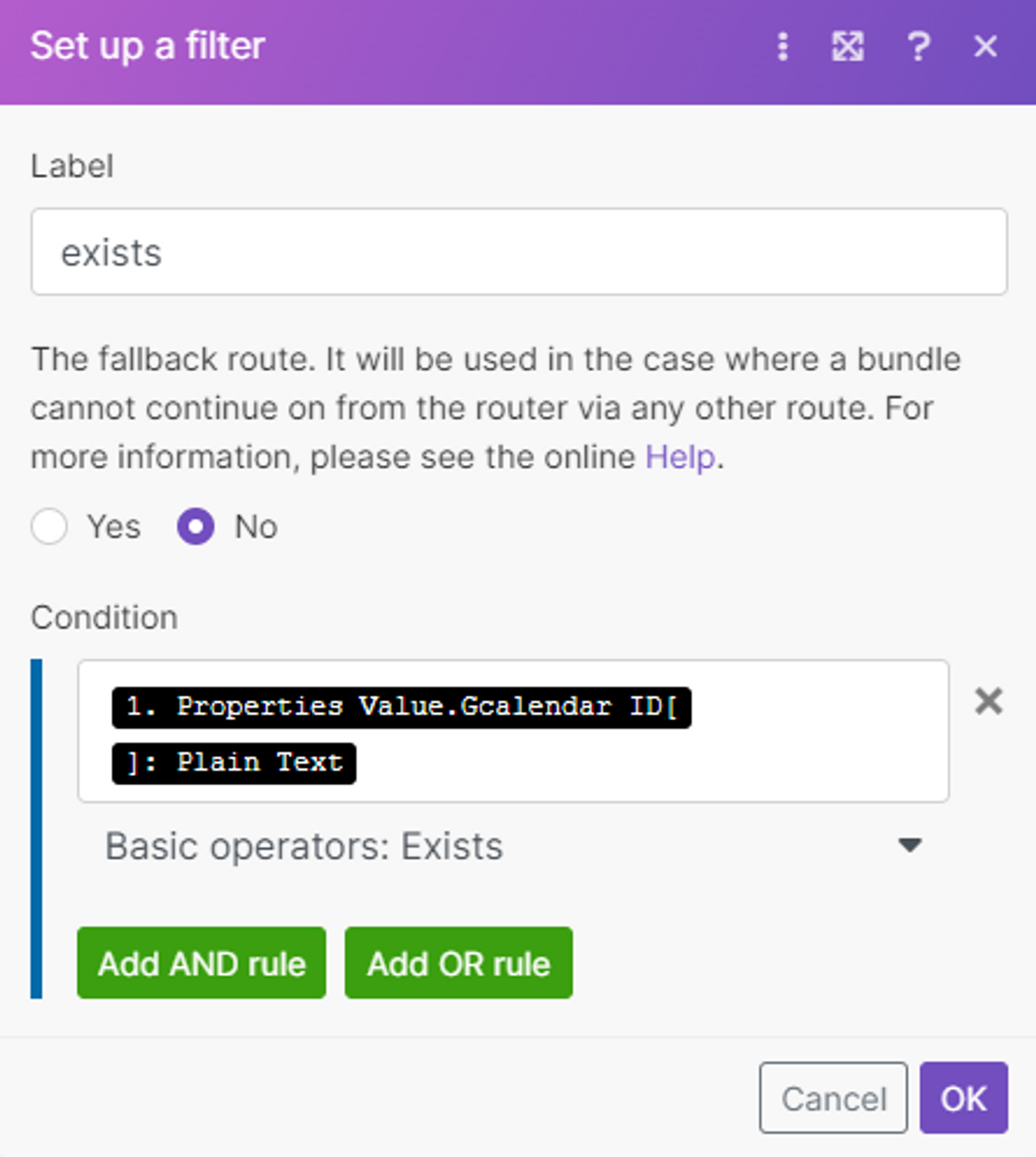
Dernières étapes
Access the clock next to the first module (Google Calendar) & set the scheduling of the automation (in minutes).
⚠️ The higher the number, the fewer “operations” (data) will be used by Make. It’s something to consider if you wish to stay on Make’s free plan (1000 ops/month).
Congrats! The scenario is finished, don’t forget to save it. Add a dummy event in your Notion table and run the scenario to see if it works (it works if you see your newly created event on your Google Calendar).
If it works, you can also increase the limit from the first module to 100 or whatever suits you. Then add a Calendar view to your Notion database, and you're good to go!
Conclusion
By following the steps outlined in this post, you can easily build a 2-way sync automation between Notion and Google Calendar. This will allow you to keep your schedules in sync and ensure that you never miss an important event again.
I hope this post has been helpful and that you're now ready to take on the challenge of building your own Notion Google Calendar sync.
Happy scheduling!
Créé ton compte Notion gratuitement 🙃 (#NotionPartner)
Une synchronisation bidirectionnelle permet d'inclure tous les événements de votre calendrier Google dans votre calendrier Notion et de refléter toutes les modifications ou tous les ajouts effectués sur vos événements Notion sur votre calendrier Google. Ainsi, tout événement ajouté, modifié ou supprimé sur un calendrier figurera également sur l'autre calendrier.
Pour commencer à configurer une synchronisation bidirectionnelle entre Notion et Google Agenda, vous devez disposer d'un compte Notion, d'un compte Google et également d'un compte Make, qui est gratuit. Sur Notion, vous avez besoin d'un tableau simple avec les propriétés suivantes : Nom [Titre], Date [Date], Lieu [Texte ou URL si vous n'avez que des réunions virtuelles], État de l'événement [Texte] et ID Gcalendar [Texte].
Cette automatisation est créée si vous prévoyez de mettre à jour votre calendrier Google à partir de Notion. Les étapes consistent à initialiser en créant un nouveau scénario dans Make. Le premier module consiste à surveiller les éléments mis à jour de la base de données Notion. Vous recherchez ensuite sur Google Agenda les événements qui ont le même identifiant que les éléments Notion mis à jour. Un routeur est configuré pour attribuer des actions en fonction de l'existence ou non de l'événement Google Agenda. S'il n'existe pas, l'événement est créé sur Google Agenda et l'identifiant Gcalendar de la base de données Notion est mis à jour. S'il existe, l'événement Google Agenda est simplement mis à jour.








